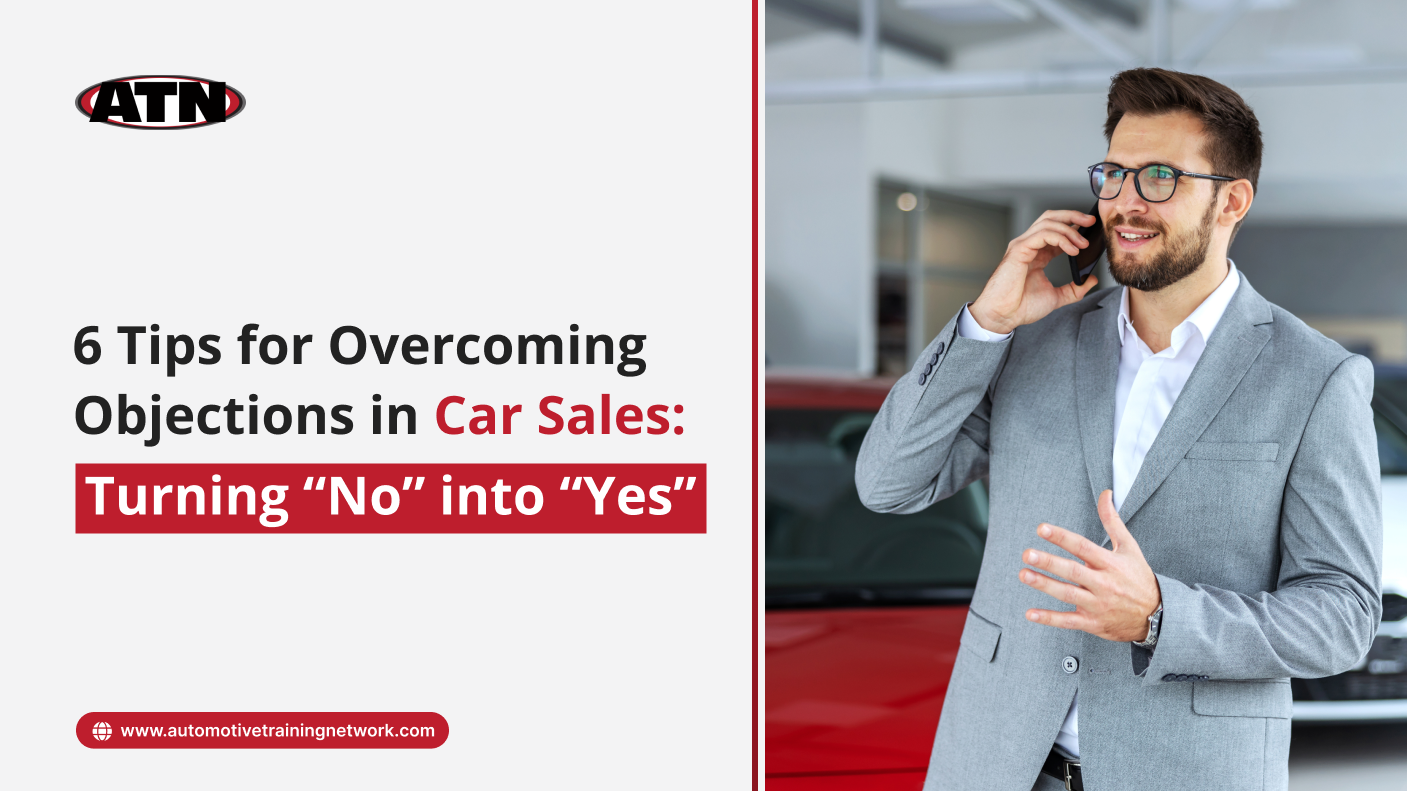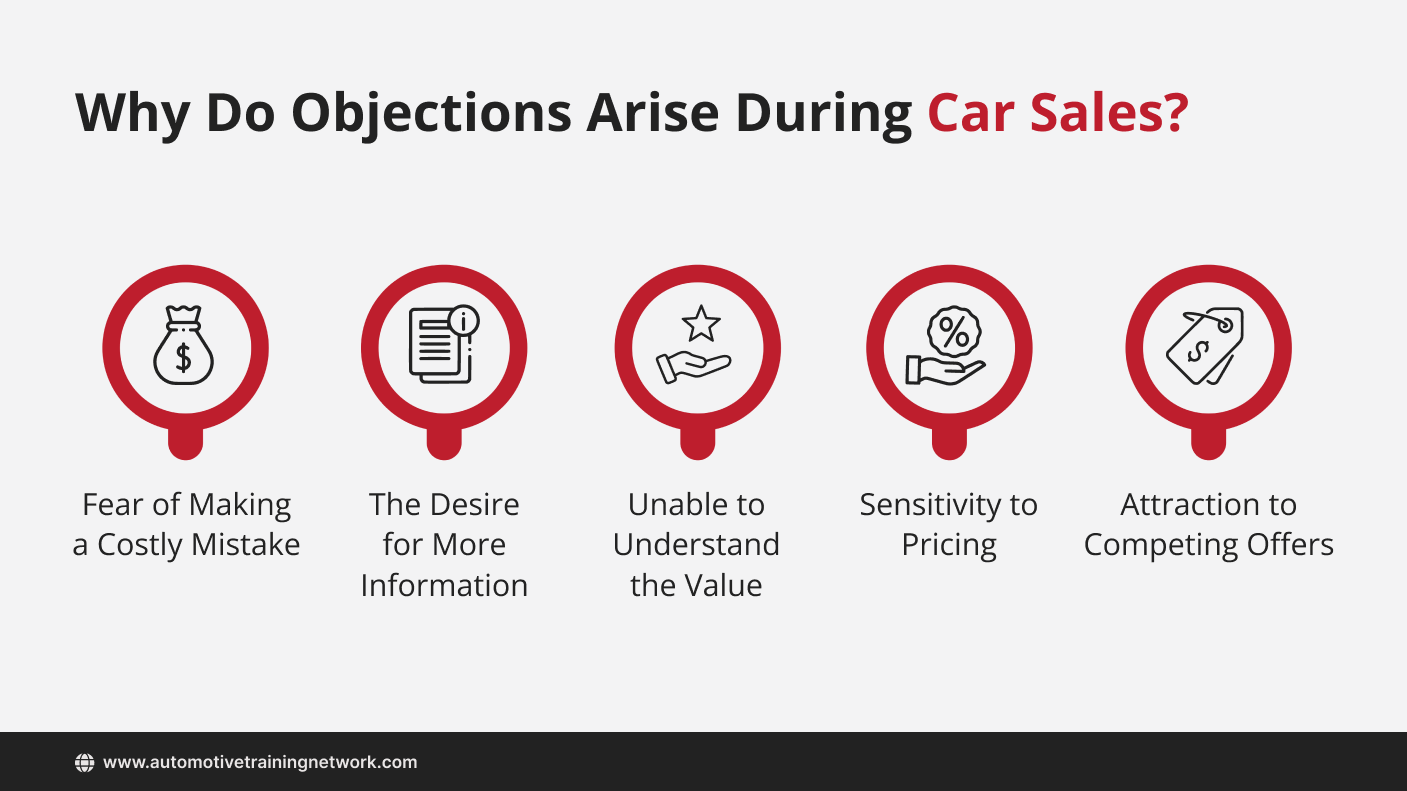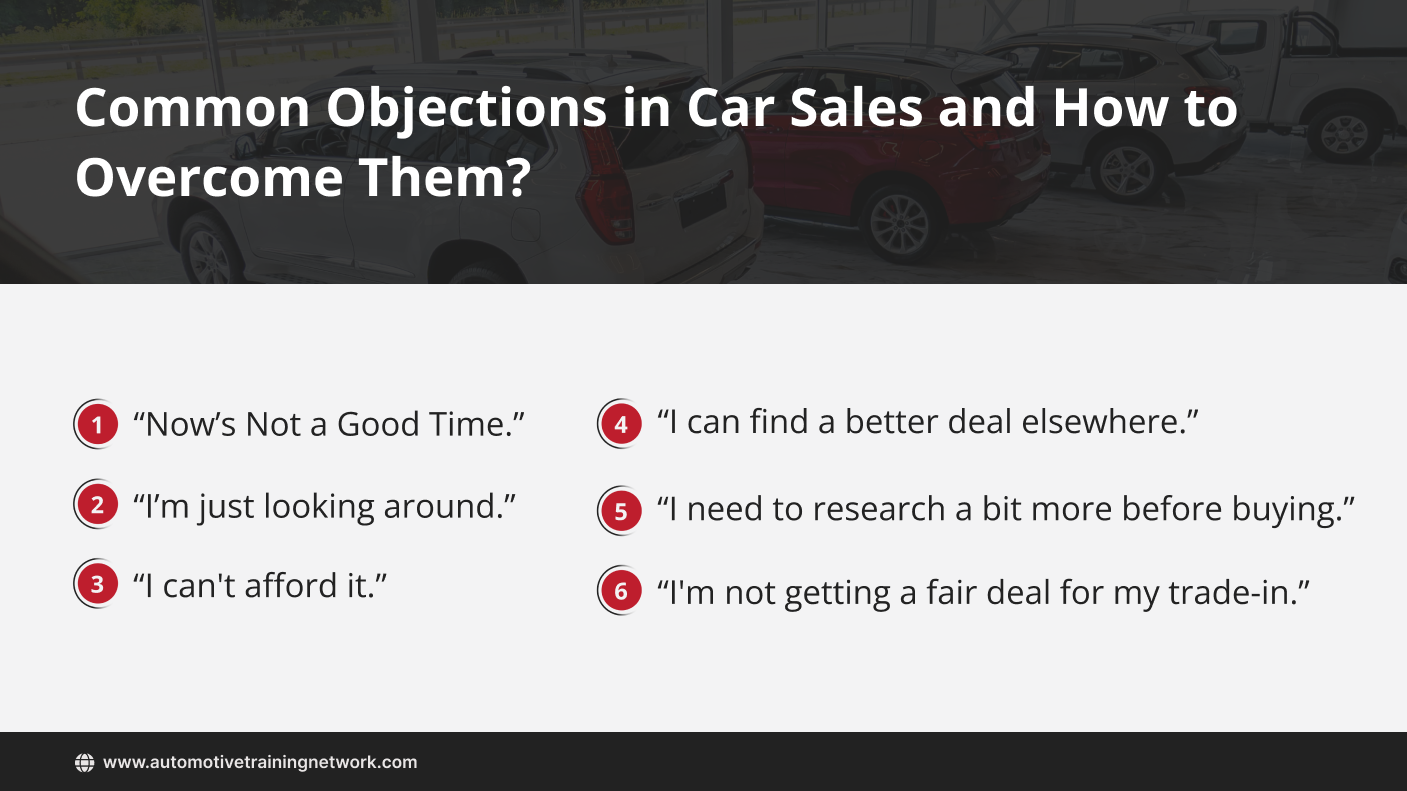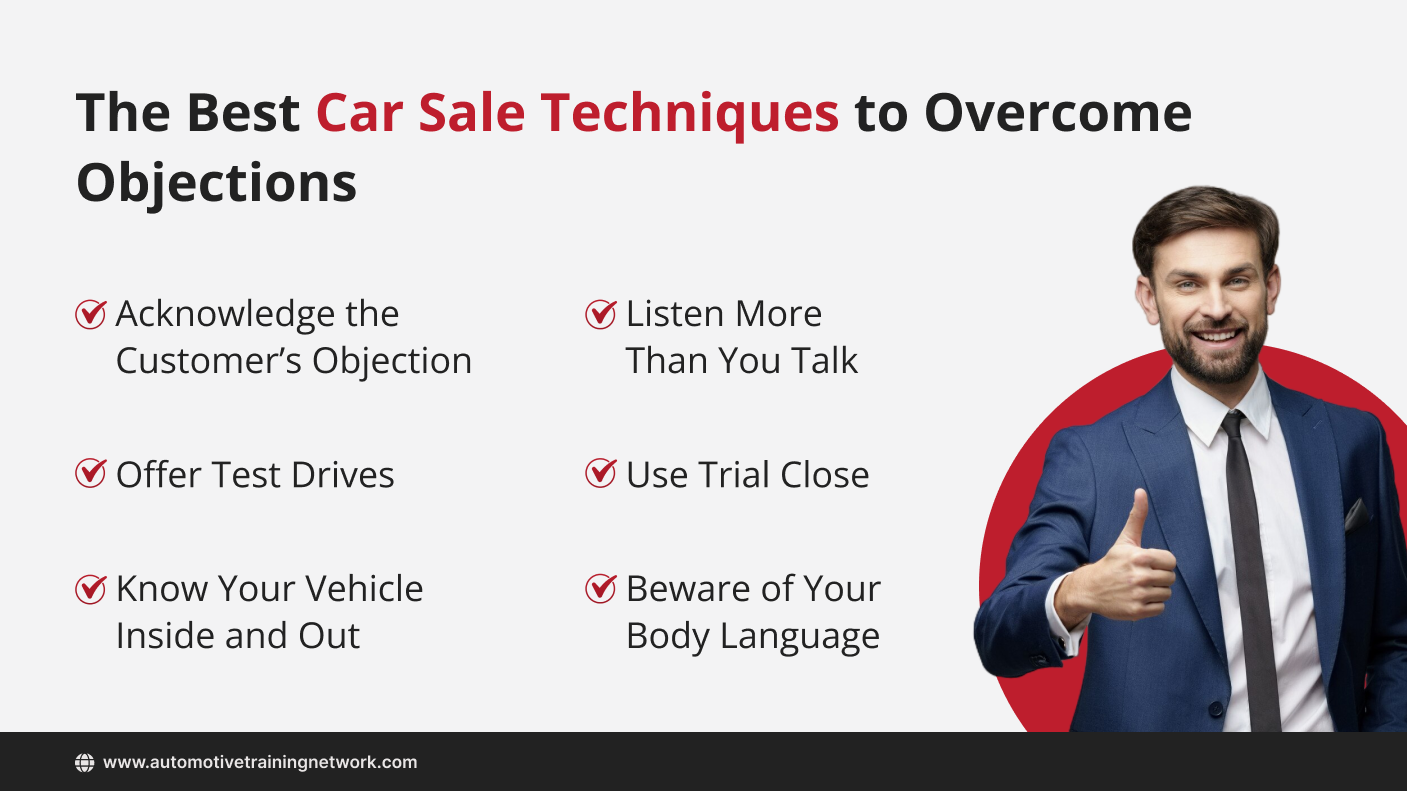6 Tips for Overcoming Objections in Car Sales: Turning “No” into “Yes”

Selling cars requires skills, strategy, and charisma. No wonder mastering this art is a thrilling challenge.
How often have you faced the dreaded "I need to think about it" after investing hours with a potential customer?
But can we blame the car buyer? After all, buying a car is a significant investment and requires careful consideration. It's natural for buyers to have many questions and concerns. There's plenty to ponder, from financing options to trade-in values and warranties.
Objections are a normal part of the sales process, and every car salesperson knows they need to master overcoming these objections to turn a hesitant window shopper into a confident buyer. You must build rapport, earn trust, and demonstrate dedication to finding the perfect vehicle that fits their lifestyle and budget.
Overcoming these objections is challenging but can be done with the right strategies. In this blog, we have listed practical car sales techniques to overcome objections. These tips will help you & your team confidently turn these tricky situations into triumphs.
Why Do Objections Arise During Car Sales?

Selling cars involves more than knowing the details of each model on the lot or how to close a deal. At its core, it’s about understanding your customer's mindset—what drives their decisions, what concerns they might have, and what might prevent them from finalizing a purchase.
You should be an expert in car sales rebuttals to guide your customers toward purchasing and understand why objections may arise to be prepared for effective car sales objection handling. Here are the main reasons car sales objections arise:
1. Fear of Making a Costly Mistake
Buying a car is a big deal, and nobody wants to make an expensive mistake. As a skilled salesperson, your job is to make them feel secure. By employing strategic car sales rebuttals, you can address their concerns effectively. Show them the car’s history, let them take it for a spin, and answer their questions clearly.
2. The Desire for More Information
Today's car buyers often come to the lot armed with facts they found online, but they still need your expert advice. You can provide the comprehensive information they seek by utilizing car sales objection handling techniques. Know everything about the cars you sell, from engine details and safety features to the latest tech. Help them see why the car you recommend is the right fit for them.
3. Unable to Understand the Value
Sometimes, customers don’t understand why a car is priced on the higher side. Here’s where you highlight what makes your car worth it. Don’t just talk about features—explain how these features make their life better. Is it safer? More reliable? More fuel-efficient? By employing strategic car sales techniques to overcome objections, you can clearly articulate how these features enhance their driving experience, thus shifting their perception of value.
4. Sensitivity to Pricing
When it comes to the price tag, many customers might get cold feet, especially if they've seen lower prices at other dealerships. Start by recognizing their budget concerns, which helps build trust. Then, guide them through different models within their budget and discuss various financing options to ease the initial cost. If they're still unsure, mention the possibility of a trade-in to make the new purchase more affordable.
5. Attraction to Competing Offers
If a buyer mentions a better deal somewhere else, know your competition. Explain what makes buying from you better. Maybe it’s a better warranty, free maintenance, or simply better customer service. Help them see that a great deal isn’t just about the price but the whole package.
Address these common concerns effectively, and you won’t just sell more cars—you’ll build lasting relationships that bring more business down the line.
Common Objections in Car Sales and How to Overcome Them?

Understanding how to overcome objections in car sales is essential for success in this competitive industry. By mastering the art of addressing car sales objections and responses and implementing effective car-selling techniques, you'll elevate your sales approach and drive closer deals. Here are some of the most common objections you’ll encounter:
- “Now’s Not a Good Time.”
When a prospect says, "Now's not a good time," it usually means they're too busy or preoccupied to focus on your offering right now. This could be due to budget concerns, ongoing projects, or personal matters. In other words, they're letting you know they can't engage or decide now.
In this situation, it's best to respond respectfully and understandingly. You could say, "I understand this might not be the best time. If you’d like, I can send a brief overview of the car, and we can chat whenever it works for you. Let me know what you prefer!"
Or, you could offer, "It sounds like you’ve got a lot on your plate. How about I email you some information about the car? You can reach out whenever you're ready or have any questions."
In this way, you ensure you respect their current situation while subtly keeping the door open for future communication.
- “I’m just looking around.”
When a prospect says, "I'm just looking around," in a car dealership, they're likely exploring different vehicles without committing. They're comparing options to find the best fit for their needs.
To assist them, offer detailed insights into your product and inquire about their priorities. For example, you could say, "Can you tell me what features or qualities you're looking for? This will help me to give you the most relevant information about our cars."
Asking about their preferences, such as fuel efficiency or technology features, allows you to tailor your recommendations accordingly. By addressing their specific needs, you can effectively demonstrate how your product meets their requirements.
- “I can't afford it.”
When prospects raise concerns about price, it's often because they're balancing it against their current financial priorities or limitations. They may not fully appreciate your car's value, making the price seem high.
To address this, engage in a friendly conversation to better understand their priorities. You could say, “I understand budget is important. Which features of our product matter most to you?” This helps pinpoint their priorities and sets the stage for tailoring your offer.
Alternatively, emphasize long-term benefits by saying, “Many clients find that although there's an upfront cost, the savings and efficiency benefits over time make it a smart choice. Want to learn more?"
This is one car-selling technique that shows genuine interest in finding a solution that fits their budget and needs.
- “I can find a better deal elsewhere.”
This objection concerns the price. The prospect might think they can find a similar product for less or believe it's too expensive or exceeds their budget. To handle this, discuss their budget to find a solution that fits what they can afford.
Explain how your product can save them money over time or solve a costly problem they might not have considered. For example, if your product requires a higher upfront cost but offers significant savings later, emphasize those long-term benefits. This can shift their focus from immediate costs to future value.
Offering flexible payment options, like payment plans or financing that spreads the cost over time, can also help. Clearly explain how these options work and how the payments could fit into their budget. This makes the price less intimidating and shows your willingness to accommodate them.
- “I need to research a bit more before buying.”
When prospects hesitate, it often means they're cautious and want to be sure about their decision. They might worry about the cost, wonder if the product is right for them, or just need time to think.
Responding and showing understanding and respect for their process are important. You could say, "I understand. It's an important decision, and it's good you're taking time to think about it."
Then, ask them to share their thoughts and concerns. Questions like, "Is there something specific you're unsure about?" or "What more information can I provide to help you feel confident?" can help.
Offering support as they consider things is helpful. You can suggest a follow-up meeting for more questions or share testimonials and case studies to show the product's value. Offering to connect them with happy customers can also be reassuring.
- “I'm not getting a fair deal for my trade-in.”
When a customer mentions, "I'm not getting enough for my trade-in," they likely believe their car is worth more, perhaps because they invested a lot initially or saw higher prices online.
Start by showing understanding. For example, you could say, "I understand why you think your car should be worth more. Let’s review the details together to ensure we're on the same page."
Be clear about how trade-in value is determined. Explain how market trends, age, mileage, and condition affect the price. You might say, "Here's how market trends impact trade-in values, and here's where your car stands."
Offering incentives like discounts on warranties or special financing rates can sweeten the deal. Throughout the conversation, emphasize your commitment to finding a solution, showing you genuinely care about their needs.
The Best Car Sale Techniques to Overcome Objections

It is important to be armed with essential car sales tips and tricks while negotiating with potential buyers. Follow these expert tips for overcoming objections in car sales:
- Acknowledge the Customer’s Objection
When a customer voices an objection, acknowledge it quickly to show empathy and build trust. Recognize their concerns calmly and sincerely. If a customer believes the price is too high or they aren't getting enough for their trade-in, assure them that their feedback is important, and let them know you're committed to finding a fair solution.
- Beware of Your Body Language
Your non-verbal cues significantly impact how customers perceive you. Make eye contact, maintain a relaxed, open posture, and use confident yet inviting gestures.
- Know Your Vehicle Inside and Out
Familiarize yourself with each vehicle's features and how these compare to the competition. If a customer is concerned about fuel economy, emphasize your car's superior efficiency. Or, if they need more cargo space, highlight the various storage options and configurations available.
- Listen More Than You Talk
Listen carefully to what the customer is saying without interrupting. Let them express their objections fully, then ask clarifying questions to understand their perspective better.
- Use Trial Close
Throughout the conversation, use trial closes to gauge customer readiness and identify any lingering objections. For example, asking, “If we can provide a better financing plan, would you be more comfortable moving forward with this model?” helps you zero in on potential concerns while keeping the momentum toward closing.
- Offer Test Drives
Nothing reinforces a customer's decision more than feeling the car's comfort, handling, and features firsthand. A test drive provides a tangible experience that addresses performance concerns and creates excitement.
Elevate Your Team's Performance with ATN's Car Sales Training!

Elevate your dealership's performance with Automotive Training Network, led by industry expert Tom Stuker. With over 40 years of experience and having served over 12,000 dealerships worldwide, ATN offers unparalleled training and consulting services.
Discover the best car sales closing techniques and learn how to handle objections in car sales effectively through our comprehensive programs. Our training covers everything from mastering phone fundamentals to handling objections with finesse.
Experience interactive virtual modules with ATNVT or attend our 4-day boot camps in Scottsdale, AZ. With personalized in-dealership workshops, we deliver measurable results tailored to your needs.
Ready to boost your dealership's sales and outshine the competition?
FAQs
1. What are the 4 steps to overcoming sales objections?
The four steps of overcoming sales objections include listening, acknowledging, addressing, and confirming. Listen carefully to the customer's concerns, acknowledge them to build trust, address their objections directly with clear information, and confirm their satisfaction before moving forward.
2. How can you effectively handle sales objections?
To effectively handle sales objections, it's important to be prepared for common concerns. You'll gain the skills to address objections confidently with proper car sales training. Building trust through honesty and transparency is essential. Tailoring responses to each customer's needs shows you're attentive to their concerns. Lastly, highlighting the value of your product by showing how it solves their problems can help overcome objections and guide them toward making a purchase. You'll be better equipped to close deals successfully by mastering car sales objections and responses.
3. How do I close the sale?
To close a sale effectively, highlight the benefits matching the customer's needs. This helps them see the value in your product or service and makes their decision easier. Ask trial closing questions to see if they're ready to make a purchase. Address any concerns they have to boost their confidence in their decision. Finally, guide them through the next steps, like signing an agreement or scheduling delivery, to ensure a smooth close. These are the best car sales closing techniques to help you boost sales and succeed.
4. What are the 4 P's of objection handling?
The 4 P's are preparing, probing, positioning, and persisting. Prepare with research and crafted responses, probe to understand the root causes of objections, position your solution to match the customer's priorities, and persist by patiently clarifying doubts until the customer is confident.
